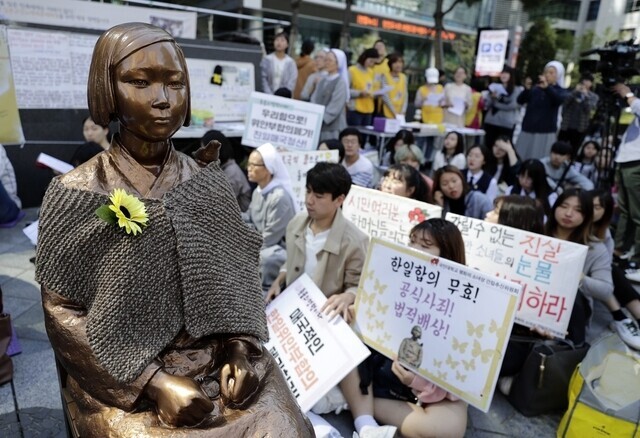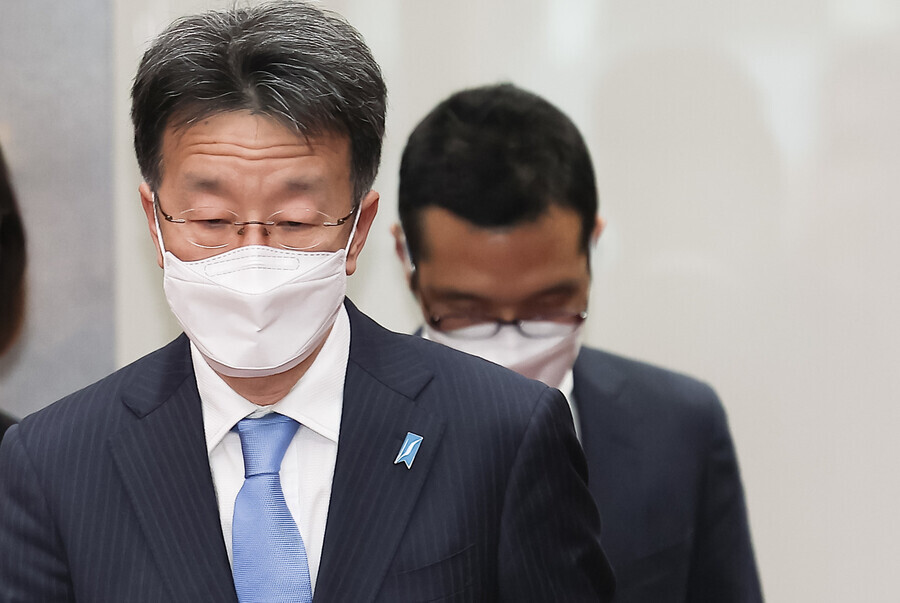hankyoreh
Links to other country sites 다른 나라 사이트 링크
Japan deletes military’s role in “comfort women” system from textbooks, reneging on Kono Statement

According to a decision reached by the Japanese government in April 2021, textbooks used by juniors and seniors in Japanese high schools will no longer specify that the comfort women served the Japanese military during World War II. These textbooks have also removed all mention of “forceful relocation,” a term that had been used to emphasize the compulsory nature of Koreans’ mobilization for Japan’s war effort.
As the Japanese government blocks the use of such language in its textbooks, Japanese society has decisively broken with the promise it made in the 1993 Kono Statement to use historical education to ensure it does not repeat the atrocities of its past, such as the “comfort women” system of sexual slavery.
On Tuesday, Japan’s Ministry of Education, Culture, Sports, Science and Technology released the results of its evaluation of 239 textbooks on such subjects as Japanese history, politics and economics, and geography that high school juniors and seniors will begin using next year.
An analysis by the Asia Peace and History Education Network and the Asia Peace and History Institute found that the expression “comfort women for the Japanese military” has disappeared from all seven of the Japanese history textbooks that cleared the government’s review.
Previously, the history textbook by progressive-leaning Jikkyo Shuppan had clearly identified the perpetrators by saying that “many women became comfort women for the Japanese military,” but the latest edition of the textbook omits the phrase “for the Japanese military.”
Among the publishers of politics and economics textbooks, Tokyo Shoseki was forced to make a major change in the government review.

While explaining the statement released by Chief Cabinet Secretary Yonei Kono in August 1993, known as the Kono Statement, the textbook had said that the statement “acknowledged the Japanese military’s involvement in the comfort women issue,” but that language was cut out on the government’s orders. In its place, the textbook added the following sentence: “The cabinet decided in 2021 that it is more appropriate to use the term ‘comfort women’ than ‘comfort women for the Japanese military.’”
These changes cleverly conceal the fact that it was the Japanese military that created and operated the comfort women system of sexual exploitation, and that the Japanese government ought to take responsibility for those actions.
The Japanese government also imposed changes on all the textbooks that had used the term “forceful relocation” to refer to the victims of compulsory mobilization. That expression has been replaced with “mobilization” in all Japanese history textbooks and politics and economics textbooks published by Jikkyo Shuppan, Shimizu Shoin, Yamakawa Shuppansha, and Daiichi Gakusho.
Such serious backsliding in Japanese textbooks’ treatment of history resulted from the decision reached by the Japanese Cabinet in April 2021 that the expressions “comfort women for the Japanese military” and “forceful relocation” cannot be used anymore. The Japanese government concluded that using those expressions “could create a misunderstanding” and that “comfort women” should be used in place of “comfort women for the Japanese military.”
The Japanese government also declared that the conventional use of the term “forceful relocation” when describing the compulsory mobilization of Koreans during Japan’s colonial occupation was inappropriate as well. Then in a press conference in June of that year, Education Minister Koichi Hagiuda confirmed that the government would no longer allow the use of those terms in textbooks.
The reason the Japanese government was able to make such a decision was that the textbook assessment standards were revised in 2014, during the premiership of Shinzo Abe, to require textbooks to adhere to the unified position of the government in the information they present. That forces even publishers who don’t agree to toe the government line, if only to ensure their textbooks are cleared for use in schools.
The Asia Peace and History Education Network, a civic group that has analyzed the presentation of history in Japanese textbooks, held a virtual press conference soon after the Japanese government announced the results of its textbook review.
“Since the Abe Cabinet, the Japanese government has maintained the specious argument that physical coercion was not used in the mobilization of the comfort women for the Japanese military. And now it is denying the military’s involvement [in the comfort women system] by removing the very mention of the Japanese military from textbooks,” the network said.
“In this way, the Japanese government is going back on its own promise to uphold the Kono Statement and is denying the findings of researchers in Japan and around the world,” the network stressed.
As the network indicated, the Japanese government pledged in the Kono Statement that it would use “the study and teaching of history” to “face squarely the historical facts [. . .] instead of evading them, and take them to heart as lessons of history.”
When Abe himself reached an agreement with the South Korean government about the comfort women issue on Dec. 28, 2015, he said he was “painfully aware of responsibilities” and allocated 1 billion yen in the Japanese government’s budget for the benefit of the comfort women.
On a related subject, most of these textbooks carried on Japan’s illegitimate territorial claim to the island of Dokdo, which is known as Takeshima in Japan. That topic was covered in detail by some of the political and economics textbooks and civics textbooks, which said that Dokdo is “Japan’s integral territory” that is “illegally occupied by South Korea” and that “Japan has continued to ask for its return.”
“We express our deep regret for the approval of high school textbooks that distort historical facts about the past according to a Japan-centric view of history,” the South Korean government said in a statement by the spokesperson of the Ministry of Foreign Affairs on Tuesday afternoon.
By Kim So-youn, Tokyo correspondent; Lee Je-hun, senior staff writer
Please direct questions or comments to [english@hani.co.kr]

Editorial・opinion
![[Column] Season 2 of special prosecutor probe may be coming to Korea soon [Column] Season 2 of special prosecutor probe may be coming to Korea soon](https://flexible.img.hani.co.kr/flexible/normal/500/300/imgdb/original/2024/0426/3317141030699447.jpg) [Column] Season 2 of special prosecutor probe may be coming to Korea soon
[Column] Season 2 of special prosecutor probe may be coming to Korea soon![[Column] Park Geun-hye déjà vu in Yoon Suk-yeol [Column] Park Geun-hye déjà vu in Yoon Suk-yeol](https://flexible.img.hani.co.kr/flexible/normal/500/300/imgdb/original/2024/0424/651713945113788.jpg) [Column] Park Geun-hye déjà vu in Yoon Suk-yeol
[Column] Park Geun-hye déjà vu in Yoon Suk-yeol- [Editorial] New weight of N. Korea’s nuclear threats makes dialogue all the more urgent
- [Guest essay] The real reason Korea’s new right wants to dub Rhee a founding father
- [Column] ‘Choson’: Is it time we start referring to N. Korea in its own terms?
- [Editorial] Japan’s rewriting of history with Korea has gone too far
- [Column] The president’s questionable capacity for dialogue
- [Column] Are chaebol firms just pizza pies for families to divvy up as they please?
- [Column] Has Korea, too, crossed the Rubicon on China?
- [Correspondent’s column] In Japan’s alliance with US, echoes of its past alliances with UK
Most viewed articles
- 1AI is catching up with humans at a ‘shocking’ rate
- 2Korea’s 1.3% growth in Q1 signals ‘textbook’ return to growth, says government
- 3Is Japan about to snatch control of Line messenger from Korea’s Naver?
- 4After election rout, Yoon’s left with 3 choices for dealing with the opposition
- 5No good, very bad game for Korea puts it out of Olympics for first time since 1988
- 6Will NewJeans end up collateral damage in internal feud at K-pop juggernaut Hybe?
- 7[Column] Season 2 of special prosecutor probe may be coming to Korea soon
- 81 in 5 unwed Korean women want child-free life, study shows
- 9[Column] Park Geun-hye déjà vu in Yoon Suk-yeol
- 10‘We must say no’: Seoul defense chief on Korean, USFK involvement in hypothetical Taiwan crisis